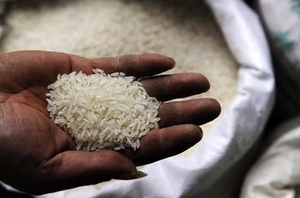 ews regarding the abysmal conditions in which China produces its food continues to go from bad to worse as new information reveals the absolute failure of the Communist Party's ability to create an environment of self-sustainability.
ews regarding the abysmal conditions in which China produces its food continues to go from bad to worse as new information reveals the absolute failure of the Communist Party's ability to create an environment of self-sustainability.Reuters reported May 22 that yet another food scandal has arisen with the discovery of dangerous levels of toxic cadmium in rice that was being sold in the southern city of Guangzhou. It was the late CP Chairman Mao Zedong's goal to make China self-sufficient, but with such a poor record of ensuring a safe food supply, that goal has, so far, been unattainable.
Per Reuters:
The ruling Communist Party has long staked its legitimacy on its ability to guarantee domestic staple food supplies, and has pledged to be at least 95 percent self-sufficient even as demand increases and the fastest and biggest urbanization process in history swallows up arable land.
That has led to a drive for quantity rather than quality - securing bumper harvests even from land contaminated by high levels of industrial waste and irrigated with water unfit for human consumption.
Growing industrialization literally killing Chinese with tainted food
And as China's population - currently at 1.344 billion - continues to grow, so will the demand for food, and places to grow it. That pressure means that the potential for China to clean up its food production remains remote, at best.
"China has a big population and we used to face food shortages so the government has focused on quantity," Li Guoxiang, a researcher at the government-backed Rural Development Institute of the China Academy of Social Sciences, told Reuters.
The safety of the country's food supply, however, has become a larger problem than growing enough to sustain the population. That is obvious given the number of food scandals recently, which have ranged from raw dairy materials contaminated with melamine, a toxic industrial chemical, to poisonous heavy metals in vegetables and rice. The growing toxicity of its food products may make "raising the share of [food] imports ... the least worst option," Reuters reported.
Beijing is facing increased pressure from the public, as well as via growing anti-pollution protests, but has vowed to reverse at least some of the damage done to the environment over the span of 30 years, when the country first began to rapidly industrialize and modernize. But that won't be easy, given the size, scope and severity of the problem. Chinese leaders want to maintain the country's expansive economic growth and find enough jobs for scores of new urban dwellers, while still being able to feed a fifth of the world's population using only 9 percent of the globe's land mass.
'Importing food not a bad option'
"Quantity is still a precondition, but the government is now putting lots of effort into safety, and high-quality food imports will definitely increase," Li told Reuters. "People will realize there are more advantages than disadvantages regarding rising food imports and things are turning in that direction."
Already China is the world's No. 1 soybean importer, outsourcing most of that to the United States. But a number of experts are predicting that China may soon have to outsource additional agricultural product that involves heavy land use like raising beef.
In the meantime, the ruling Communist Party has a nationwide food production mess to clean up, and it's a daunting - if not impossible - task. As NaturalNews editor Mike Adams, the Health Ranger, has noted, so-called "organic" food from China "is largely a hoax." (http://www.naturalnews.com)
Regarding just the latest food scandal, government inspectors from Guangzhou "collected samples from 18 locations in the city and found cadmium levels in eight exceeded the national standard of 0.2 micrograms per kilogram, with some as high as 0.4 mg/kg," Reuters said.
Yin Lihui, with the Hunan Province's environmental protection office, told state media that mining of nonferrous metals in the region have created wastewater run-offs into sources which are used to directly irrigate crops. That has caused heavy pollution in an area known as the "home of rice and fish."
Part of the problem is an improper pairing of industries.
"We call it 'integrated food and mining complexes' - basically food production and mining happening at the same place together, and this isn't rational," Chen Nengchang, a researcher at the Guangdong Institute of Environmental and Soil Sciences, told Reuters. "The problem is that China has a big population and scarce land and soil, so we need to figure out another way of dealing with this."





